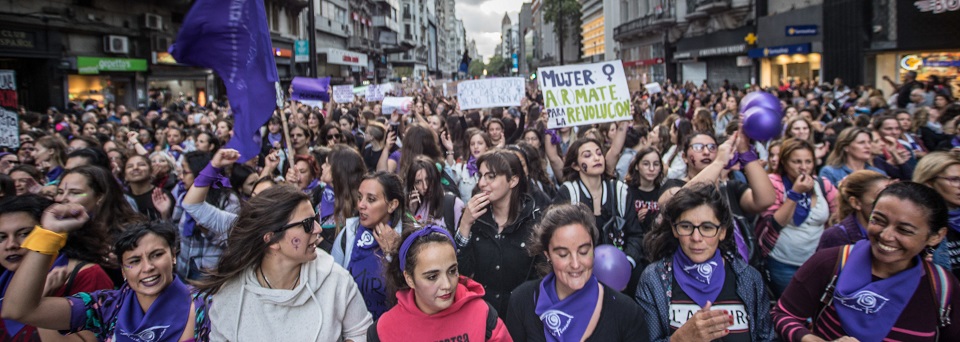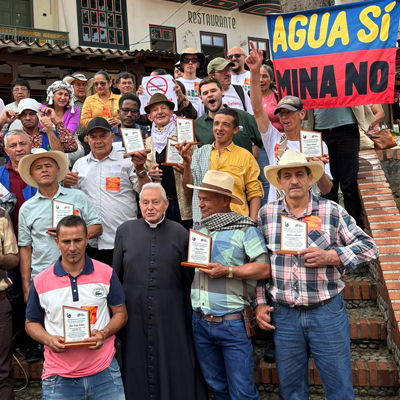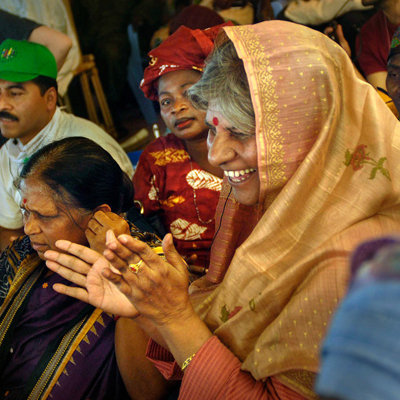8 March: We must march together
Friends of the Earth International joins the World March of Women’s 5th International Action
 8M, Montevideo, Uruguay, 2019. Foto: Edgardo Mattioli/RMR.
8M, Montevideo, Uruguay, 2019. Foto: Edgardo Mattioli/RMR.
“We resist to live, we march to transform!” is the slogan for the 5th International Action by the World March of Women, set to begin on 8 March, 2020.
Every five years, the World March of Women (WMW) prepares an international action which brings together women’s movements, to take action against neoliberalism and mobilize, connecting local struggles and organizations with the international strength of the feminist movement.
In 2020, the main themes will be: resistance against the militarization of bodies, lives and territories; anti-capitalist and anti-imperialist struggles; opening borders and “denouncing the role of walls” in the persecution of migrants; and calling for the self-determination of peoples, women and territories. The action is marked by resistance to the neoliberal and conservative offensive, which is attacking lives, territories and the work of women and the poor.
Graça Samo, coordinator of the WMW International Secretariat, described to RWR the features of the 5th International Action. This includes analyzing the actual concerns of women and the political and social contexts around the world, with the rise of right-wing and fascist forces in different countries and regions that are undermining peoples’ rights – especially women’s rights.
“We see that in many countries democracies are collapsing. There are more wars than 20 years ago with the advance of neoliberalism. Women had to come together.” The 5th International Action also denounces that transnational corporations are taking away our lands and attacking communities.
Not just on 8 March
“Every day is a day to mobilize. Every day is a day for every woman to speak out, to support the social environmental justice struggle and to support one another. But it’s important to mobilize on this 8 March – with allies like WMW – to speak out, to expose all the injustices against women, to be heard, not only to be seen,” said Rita Uwaka from ERA-Friends of the Earth Nigeria, and member of Friends of the Earth International’s Gender Justice Dismantling Patriarchy working group.
8 March is a special day to “build collective solidarity around issues of women and visibilize their struggles and their contributions to social-environmental justice around the world,” said Rita.
In addition to doing paid work (in the labour market), women typically do unpaid domestic and care work (in the home), ensuring the reproduction of human life. This must to be recognized and considered also as part of the work they do every day. Rather than being a “natural” role for women or the female gender, this is a cultural construction that can be changed. “We live in a world where capitalism is speaking all over the place, and this is forwarded with patriarchy, and this causes a lot of inequality and discrimination, it’s a lot of oppression that we need to dismantle. This ‘men´s world’ is the same world where women contribute a lot to the protection of environment but they are not recognized yet,” stressed Rita.
For this reason, Friends of the Earth International is committed to supporting women who suffer from inequality, injustice, and impacts of the social and environmental crises in different territories. The environmental federation seeks to give visibility to women’s contributions to environmental justice struggles, and to denounce the social, emotional and physical violence suffered mostly by women, everywhere and anywhere.
“We need to dismantle patriarchy collectively, in order to ensure system change, and women leadership needs to be supported. We, women, are suffering the impacts of many activities as extraction, land grabbing and massive plantations” – Rita Uwaka (Friends of the Earth International).
In order to counter the rise of neoliberal and conservative forces, Graça Samo also highlighted that “we need to march together”. She reminded us that “if you want to build movement, you need continuity – articulating actions and avoiding individualism. We need to have the guts to come together in a collaborative movement.”
Considering the new generations that are joining feminist movements, we asked Graca what she wishes for new feminists:
“Young feminists have a lot of energy and creativity, but it is the same generation that has no work, has no economic autonomy, that lives in an isolated way. So I wish they learned how to organize it. We need to share our story with them so they can understand where we come from. To tell our history we need to understand patriarchy. Capitalism and colonialism will use class, race and heteronormative practice to separate us. We need self-organization: you can’t go to feminism by yourself, you have to get out of your room and your computer, come together and occupy space. My wish is to build a strong and collaborative movement.”
What are we resisting against and what we want to transform?
“We want to resist all forms of violence against women, inequality between men and women. Women should also contribute to public participation and decision making: and that’s one way we can transform. We need to embrace sustainable solutions: that’s the only way we can get transformation. Also support women leadership and build solidarity economy among women – because economic power is what is used to really cause the deep inequality there exists between men and women. We mobilize, we resist, we transform,” concluded Rita Uwaka.






